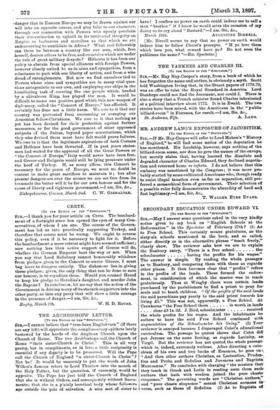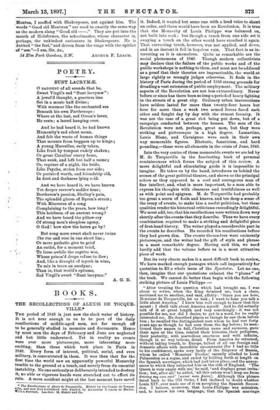Sin, — May I answer some questions asked in the very kindly
notice given to my book on "English Schools at the Reformation" in the Spectator of February 27th? (1) As to Free School. This certainly means gratuitous, as the sixty-Rix schools mentioned in the book, and so called., either directly or in the alternative phrase " teach freely," clearly show. The reviewer asks how we are to explain the Banbury entry, "There is a free school the schoolmaster having the profits for his wages."
The answer is simple. By reading the whole passages as to Banbury, and comparing them with those as regards, other places. It then becomes clear that " profits " refers to the profits of the lands. These formed the endow- ment, in consideration of which the master was to teach gratuitously. Thus at Wragby there were certain lands purchased by the parishioners to find a priest to pray for souls and to teach children. " Of the profits of the said /ands, the said parochians pay yearly to the said priest towards his living 25." This was not, apparently, a Free School. At Crewkerne "the Free School there is worth in lands . . . . clear ea ls. 3d. J. Bird, schoolmaster received the whole profits for his wages. And the inhabitants be suitors to have the said Free School continued with augmentation of the Schoolmaster his living." (2) Your reviewer is annoyed because I disparaged Colet's educational curriculum. The passage he quotes shows that Colet did' put Jerome on the same footing, as regards Latinity, as Virgil. But the reviewer has not quoted the whole passage- which is, indeed, extremely verbose. After directing a cate- chism of his own and two books of Erasmus, he goes on "And then other authors Christian, as Lactantius, Pruden- tins tins and Proba and Sedulius and Jnvencus and Baptista- Mantuanus." He concludes with charging " the masters that they teach in Greek and Latin in reading unto them suck authors that bath with wisdom joined the pure chaste eloquence." The governing words are "Christian authors," and "pure chaste eloquence " meant Christian sermons 'in' verse, such as those of Sedulins. (3) As to Baptista of
Mantua, I scoffed with Shakespeare, not against him. The words "Good old Mantuan" are used in exactly the same way as the modern slang " Good old —." They are put into the month of Holofernes, the schoolmaster, whose character is, perhaps, the unkindest caricature in Shakespeare. He is dubbed " the fool," and driven from the stage with the epithet of "ass."—I am, Sir, &c.,



































 Previous page
Previous page